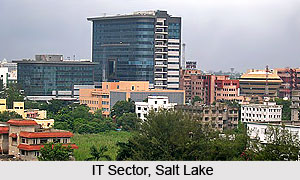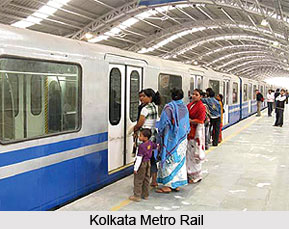 The economy of Kolkata is full blooming since Kolkata has been serving as the capital city of the British. Kolkata, being the second city of the British, is the principal site wherefrom the British operated their trade with the eastern parts. Therefore the trade as the economic foundation of Kolkata has its beginning in the British India. Moreover the rapid industrialization in the post independence period served the economic growth of Kolkata.Presently Kolkata is the primary business, commercial and financial hub in eastern India.
The economy of Kolkata is full blooming since Kolkata has been serving as the capital city of the British. Kolkata, being the second city of the British, is the principal site wherefrom the British operated their trade with the eastern parts. Therefore the trade as the economic foundation of Kolkata has its beginning in the British India. Moreover the rapid industrialization in the post independence period served the economic growth of Kolkata.Presently Kolkata is the primary business, commercial and financial hub in eastern India.
Kolkata at the eastern part of Hooghly represents a uniformly homogenous landscape. Moreover the close proximity to Ganges and effective rail-road network of West Bengal, with one international airport (Indira Gandhi International Airport) provide an excellent infrastructure for the economic development of Kolkata. It is the industrial development, which has induced a financial stability in Kolkata. Kolkata is the abode of many industrial units of large Indian corporations, whose diversified product range includes engineering products, electronic and electrical equipments, cables, steel, leather, textile, jwellery, frigates, automobile, wagons, railway coaches, paper, pharmaceuticals, chemicals, tobacco, food products etc. Some notable companies, like ITC Limited, Bata India, Haldia Petrochemicals, Birla Corporations, Merlin projects, Bengal Peerless, Coal India Ltd., Exide Berger paints etc have their headquarter in the heart of Kolkata.
This wide range of industries provides a vast amount of employment, thus supporting the local economy of Kolkata and the standard of living to a great extent. Besides, the superior quality of industrial products is exported which draws a maximum of foreign exchange thus supplement the economy of Kolkata.
There is also a system called informal economy or the general market income, popular in Kolkata, in which the slum dwellers that does not have the skill enough to work in the large-scale industries, mainly participates. The informal economy includes all the works by which the direct payment occurs, such as laundering, housecleaning, sweeping, plastic salvaging, plumbing furniture making, masonry, electrical wiring, TV repairing etc. Since the major part of Kolkata is urban, the unskilled immigrants arrived from the suburbs and the adjacent areas of Kolkata have settled in the slums and constitute an economy of their own. Till date the flexible production is the basic norm of the economy of Kolkata and the informal economy comprised about 40% of Kolkata`s labor force.
In spite of the escalating success of the industrialization programs, the economy of Kolkata suffered a long session of stagnation since the early sixties till late nineties. The partition along with the enormous migrant refugees, unexpected collapse of the jute industry, threats of the trade unions and the Naxalites, continuous strikes and all the more Bangladesh War, adversely affected the infrastructure and financial basis of Kolkata.
Kolkata at that time incurred a heavy loss, which completely shattered the economy.
Once a "dying city", Kolkata saw an economic progress with the liberalization of Indian economy. In the millennium Kolkata`s fortune has been improved with the establishment of the industrial estates and the software hubs. The reorientation of the earlier industries also serves the economy of Kolkata largely. The industrial estates like Dankuni, Uluberia, Kalyani, Kasba, and Howrah are spread throughout the urban agglomeration. A huge leather complex in Bantolla has augmented the industrial progress in Kolkata. Falta has been developed as an Export Processing Zone (EPZ). These industrial zones at the same time providing employment also participate in export of their products. These industrial sectors are the outcome of the globalization and liberalization of economy. Hence the sole motive of these industries is to execute maximum trade, thereby reinstalling the erstwhile financial status and stability to Kolkata.
 Kolkata presently is one of the Special Economic Zone (SEZ) in India. The SEZ developed at the core of the Salt Lake City in the recent times accounts for much of the foreign direct investment and a large quantity of export. The software and the electronic fields, which are becoming prominent in the industrial arena of West Bengal, have their key site in Kolkata. With ongoing construction or the Rajarhat New Town and the extension of Salt Lake, Kolkata has been approaching towards a preferred site of IT/ BPO. With the software products and business processing Kolkata has been participating in the vast international economy.
Kolkata presently is one of the Special Economic Zone (SEZ) in India. The SEZ developed at the core of the Salt Lake City in the recent times accounts for much of the foreign direct investment and a large quantity of export. The software and the electronic fields, which are becoming prominent in the industrial arena of West Bengal, have their key site in Kolkata. With ongoing construction or the Rajarhat New Town and the extension of Salt Lake, Kolkata has been approaching towards a preferred site of IT/ BPO. With the software products and business processing Kolkata has been participating in the vast international economy.
The IT and BPO sectors fetch mainly the youth folk contributes to the economic development of Kolkata. More and more businesses including the multinationals, find Kolkata, suitable for establishing their offices. The low cost and ample supply of talent led the foreign investors to set up offices in Kolkata. Hence Kolkata is benefited dually- the industries provide employment and insisted the economic development. The entire state being so dependent on Kolkata that the recent boom in the economic scenario of Kolkata also brought an effective change in the economy of West Bengal.
The indigenous and the multinational banks dotted over the extensive areas of Kolkata, no less share an important role in building up the economic set-up of Kolkata. The UCO and the United Bank of India have their home offices in Kolkata, which provides employment to the local people. Moreover the first foreign bank Standard Chartered has a major branch in Kolkata. A bulk of other foreign and national banks have either their home offices or the major branch in the heart of Kolkata. The banks are engaged in financial transaction in local areas and also overseas, which directly augment the economic growth pioneered by the industrial development in Kolkata.
The core of Kolkata is not involved in the agriculture directly. It is in the suburban areas, where agriculture prospered. Though the mainstream economy of Kolkata is not dependent on agriculture, the staple food and other requirements are being supplied from the adjoining areas. However the agro-based economy of those areas dependent on Kolkata as the city provides the export and easy transport of their surplus products.




















